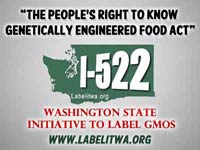Washington State Voters Reject I-522 Food Labeling Proposal

Initiative 522 on the November 2013 Washington state ballot, if enacted, would have required labeling of genetically engineered foods, as defined in the measure, on the packaging of raw agricultural commodities, processed foods and seed and seed stock, or on retail shelf signage for unpackaged products.
The measure would have required food products offered for retail sale in Washington to be labeled “clearly and conspicuously” on the front of the package if they are, or may have been, entirely or partly produced with genetic engineering.
The No on 522 campaign claimed victory as Washington voters soundly rejected Initiative 522. The initiative was brought to the Washington state ballot by anti-GMO activists to ban foods derived from genetically engineered crops. The initiative was opposed by a broad coalition of family farmers, scientists, doctors, consumers and businesses from across the state and across the country.
The vote was 54.8% opposed to labeling and 45.2% in favor of it.
“Sooner or later, one of these is going to pass. It’s only a matter of time. At some point the industry is going to get tired of pouring this kind of money into these campaigns,” said Marion Nestle, a professor of nutrition at New York University.
She said she doesn’t believe there’s anything dangerous about genetically engineered foods but is concerned about corporate control of the food supply.
The U.S. Food and Drug Administration does not require foods containing genetically engineered ingredients to be labeled because it considers them “functionally equivalent” to conventionally grown crops.
Looking for a reprint of this article?
From high-res PDFs to custom plaques, order your copy today!




